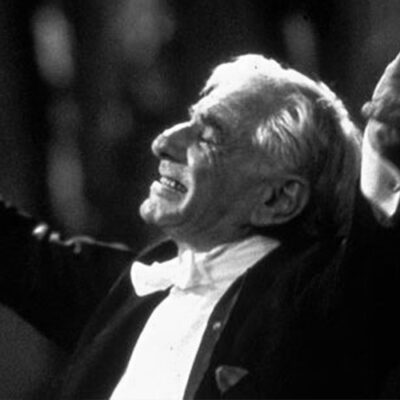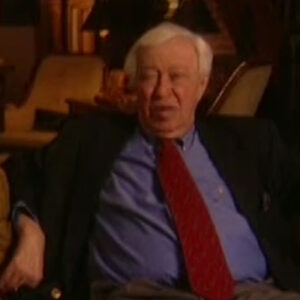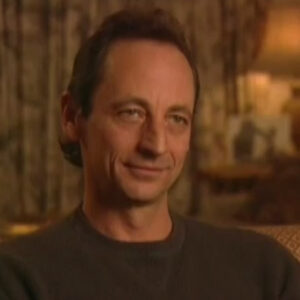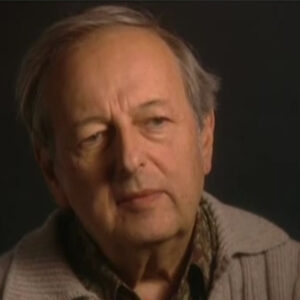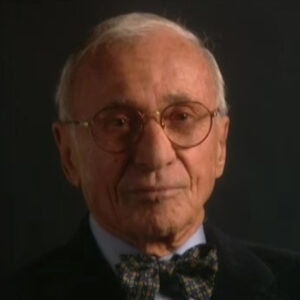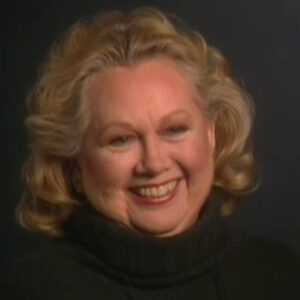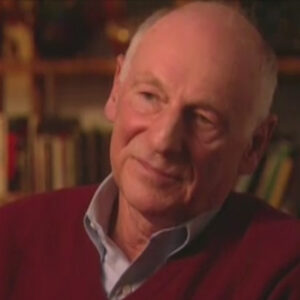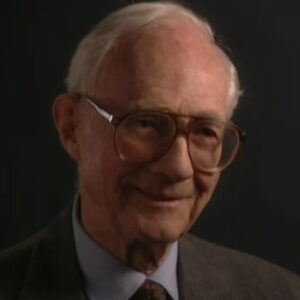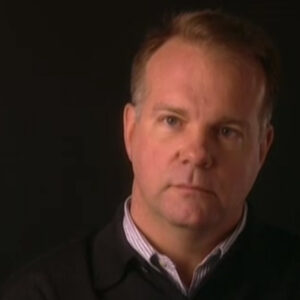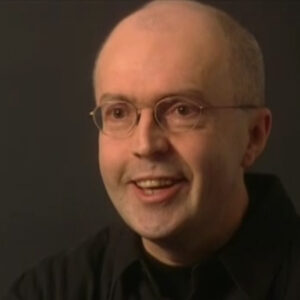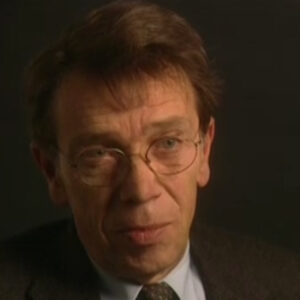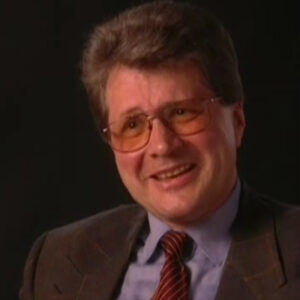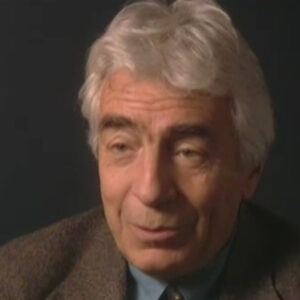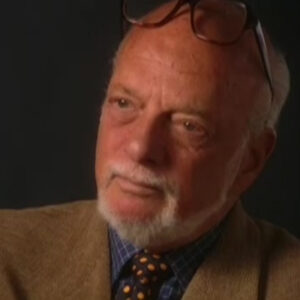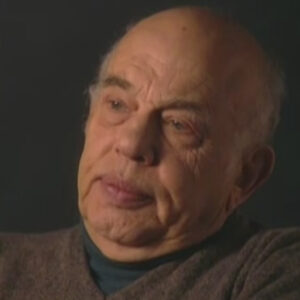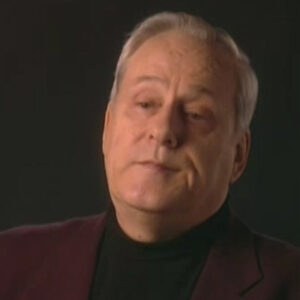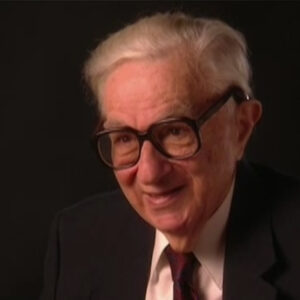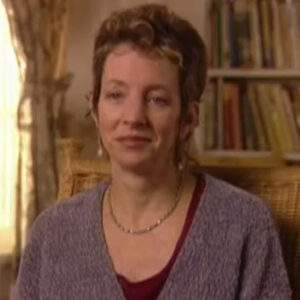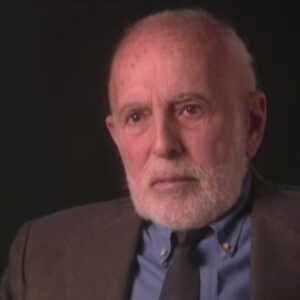Speaker Lenny, I had the possibility to meet Lenny in New York, and it was 1966, I was singing The Fall on a Shuttle, Barack’s wife, and there was a concert with Lenny and William Kim. And in the intermission, I went to him and I presented myself. I said, hi, I’m Krista Ludwig.
Speaker And so and he said to me, Oh, you are my new McCullin. I said, I know you you you make an error. I’m always Octavian. No, no, no. You are my new Marcelin.
Speaker And because my mother, when I sang for the very first time, I was 21 or 22 years old.
Speaker And I think for the very first time, Octavian and my mother, who was my teacher and also a singer, and she made me a present with the music and she wrote in it now for Octavian and later for martialing. So I thought perhaps my mother was right. And when Lenny. No, this was Maestro. Maestro Bernstine once that I sing Marklin, so I will do it. I was very, very nervous. But he saw me as a soprano in the Metropolitan and this was the first connection I had. And then he had in Vienna.
Speaker He conducted the Second Symphony Wamala and I was his alto, OceanaGold and.
Speaker I never, never in my life will forget this experience I had for the very first time to listen to the real Malha sound and the real Malha emotion I got, because until this time I sang it, I heard the music, but I didn’t understand the music. And with him I could understand the music.
Speaker What did he do that other conductors had done that may not connect to the music in a way?
Speaker I think because he’s a composer, he was a composer. He had this feeling to not only to interpret the music, to be an interpreter, but he composed it again. So he knew what almost what Mahler meant. When he was writing the music and he had this wonderful symbiosis with emotion and intellect, because some conductors are on the intellectual side or on the emotional side, but he had this symbiosis together and this was this human being which came through the music. And and I wasn’t the right age. And there wasn’t there like a like a spoon and the rice not not a spoon. And Shrum and Schwamm. What is about a sponge? It’s not it’s not the spoon. It’s I was like a dry sponge and I was filled up not with water. I was filled up with this emotional music by Bernstein conducting. And this was the reason I understood for the very first time with him almost all the music I sang with him. What are some of the other musical experiences? Yeah.
Speaker Then came causin Cavalia, of course, and this was very funny here, because there comes an American Jew and will conduct for the most Viennese opera, for all operas, a black lady or mixed lady, sang Sophie, the Viennese little girl, a baritone, my former husband, Waterbury. He sang the bus apart from Oxfam National, Valli’s girl, Gwyneth Jones soprano sang Octavian and I as a mezzo soprano and the Berlin born. I sang in and this was everybody said, Oh, no, this is impossible. Impossible. It’s not possible that this will work. God and by him, by Bernstine, it worked so beautifully because he was more Viennese than ever been in this together.
Speaker And he felt this bittersweet music from this Gougne area era era from the imperial Austrian people. He felt it in himself. And I think because as an Eastern Jew, he couldn’t understand the Austrian soul, if you can speak from soul.
Speaker But this Austrian soul, he understood and this and he kept everything wonderful together. So it was a wonderful experience. And what was very nice each evening, every evening when he conducted Rosenkavalier, one retros was on his puppetry. What is it where the music is? Yes. And every evening was there, the red rose. And between this rehearsals we had suddenly there was an evening that this was disco, had a recital in Vienna and he canceled. He was sick. And the director of the concert came and said, oh, this is impossible. We have a sold out house and there must be something very special that the people don’t give back the tickets. And he was asking Leonardo if he could make a recital with my former husband and myself with the Canadian Wunderman Bimala. And we had a lot of rehearsals here in the Bernsten Suite in the hotel Zaha. And we made this. So I target it was in two days. It was so it was so quick, quick, quick, quick, quick. And I think it is also a record. They took it for the life.
Speaker And this was fantastic because when he was accompanying on the piano, it was not like a normal accompaniment. What do you say, an accompanist? Yes, it was not a normal accompanist. He made the orchestral sound. He knew, of course, the orchestral sound, and he made it with his hands.
Speaker And, yeah, you know, it is almost impossible to speak about emotion in music. This is to feel. And this is to listen to.
Speaker Yeah, and then came Missa Solemnis, also here in Vienna and shortly before his father died and Mr. Solemnis is a very, very difficult piece for all the conductors, for all the singers and for the audience to understand, because it is a piece which is not easy to to understand. And I sang it so often in my life. And this was also the very first time I understood. And again, I mean, he is not Catholic and this was a Catholic Mizz. And he did it in a way that. I understood. And this is my my gratitude, the greatest gratitude in my life, that by him I understood what is behind the music, not only the beauty or the technique or whatever you can say with music, music making, but what is deep. Under, over, above, right, left behind music, these are understood by. And this is my greatest gratitude I have that I understood music. Yeah.
Speaker Incorrect. That I vaguely remember that you said once in an interview that you never wanted to do Mr. Solemnis again after you had done it.
Speaker I don’t know if I said it, but it could be. It could be right. Yes. No.
Speaker You know, a singer sings. That’s the profession. So. I know it’s very difficult to talk about emotion in music, but do you could you try, if you could, to to explain or describe really?
Speaker How many did it and what kind of phrases did you use, what kind of how did he rehearse with you? How did he impart the meaning of the music to you?
Speaker That is, that it’s very difficult to explain music because a painter paints a picture and the composer composes music. But to to speak about music this to people. They don’t do music. They don’t exercise music. They only speak about them.
Speaker Excuse me. Yeah. Is going to.
Speaker I can you say yes? Yeah. Is to me, he he wished starting in.
Speaker But since it always to me he wished to be a rabbi because he loved to teach also for the young people, but he never teach like this, you have to do this or that.
Speaker Never, never, never. It was his behavior. It was his human being. It was the enthusiasm he had and the emotion he had a..
Speaker And this jumped over to me or to other people had jumped over. As I said to the whole audience, they were crazy.
Speaker The audience there were here in Vienna, they were screaming. They were crazy. So.
Speaker It was his human. It was his human, Lee, what do you say humanely mensch then? He was a human being. He was. And everything when he said, do this phrasing like this, you could do this a little bit softer.
Speaker And he sang with his terrible, ugly voice. He sang whatever was very funny. But we understood also his ugly voice, what he wanted to do to to to show us.
Speaker And and he was sometimes very slow. He was not on the quick said, we have conductors on the quick set and we have conductors on the floor. So I would say Lenny was on the slow set, but with this slow side, all the the instruments came out. There was the floor, there was the violin. There was this. You could hear it. And after Lenny, when I sang the same Mahler symphony or whatever, and as it always in the in the orchestra and I hear it very well. And after Lenny, I thought, where is the music? I don’t hear the music. Where is it some conductors are conducting. Yeah, so the music is coming, but not the instruments, I didn’t hear it and yeah, yeah, fantastic.
Speaker When you first started the air to.
Speaker Lenny, did he accomplish. No, no, this was this was Okita. Of course. Yeah.
Speaker You work with him on something where he was the accompanist or was the rehearsal?
Speaker No, this was a recital by Brahms. We did a recital by Brahms in in New York. And this was very, very difficult for me because he approached again from the side, from orchestra side. We had, for example, one song in Malaysia with Ben Schloemer. This is a melody like I think it is the Second Concerto for Piano. Da da da da da da da da.
Speaker So and he wanted it in the tempo from this concerto. But the text is so sad. A woman, I’m a woman so I await death. So my, my, my, my sleep is always soft, more softly and more so. So it was it has to be not so quick. And he wanted it quick because he came from the concerto. So I had a difficult time with it sometimes. But in the end we we found each other in the middle and this was a great evening. It was. Oh my goodness. Was that recording. Yes. I didn’t know it. You know, sometimes with with words and you never knew that it is recorded. All the microphones are hanging.
Speaker And then suddenly you hear you you have a disc on the on the market and you never knew. Where does it come from. So it was taken from this wasn’t Carnegie Hall and this was the it was wonderful with Brahms. And of course we’ve made oh, it’s a television with Brahms leader. And that was great. Yes.
Speaker This is perhaps a little bit technical, but yeah, to satisfy my own curiosity, I mean, you say he came at it from the orchestral. Yeah. Do you mean as opposed to chamber music.
Speaker What do you mean. I mean he comes he came from the sound of orchestra because.
Speaker The Mahler songs are always also for orchestra. Is this for piano and for orchestra? But the Brahms songs are not for orchestra, and he approached the Brahms songs, which were originally or only for piano. He approached it because of this melody from the Second Piano Concerto. He approached Brahms like an orchestra.
Speaker And I must say, I was so astonished by the sound he made in the piano. But when I listen to it today. It is something special and it is great and because when a great man, a great musician does something wrong, perhaps it is it is fantastic wrong and it is beautiful.
Speaker So you never can say or this tempo is a little bit too quick or too slow or whatever. It is fantastic anyway.
Speaker Well, I noticed that you talked about that in other interviews with something I love that you actually appreciated the spontaneity. Yeah. And the varied interpretations and the varying tempos. Why do you think so many people were so critical of.
Speaker I mean, if somebody.
Speaker Is famous and so successful and different from other people. This is a certain like racist racism, then you have a lot of people and we invite envy him and.
Speaker Yeah. These are small people.
Speaker Yeah, these are small people. A great man is very difficult to take for. Normal, normal people, you have to have the same waves, the same. I I think I had the same wave sometimes I will not say always, but sometimes with him together, this is like a singer to a conductor is like a Cirque circuit. What do you say, electrica Cirque. This comes from one to the other. It goes and it comes and it floats. And this is making music. It has to come. You have to give and to take. And it must be like this. And if this is a ball in between and you don’t like the conductor, you don’t like the music making, then it’s impossible. And then it’s only you only music. It’s not the meaning of the music. I understand exactly what you said you were in Israel with.
Speaker Yeah, and you didn’t know this was.
Speaker Yeah, we did or not, did we? Although I don’t know anymore, I only know that we did it one day at it. I think perhaps we did. Also my last second I don’t remember the year when the error it was nineteen hundred seventy one.
Speaker And also we take we took in the, in the museum in Tel Aviv, we took the Brahms’ leader for television and this was in 71.
Speaker Yes. And I was very afraid in Israel to sing Mahler because.
Speaker Because of this was what happened in Germany with the Jews and the Holocaust and everything like this, I always felt always also today I feel always guilty. I had nothing to do. I was I was a child, but I always feel guilty. And I when I went for the very first time to Israel, I must say I love Israel. But when I see the people on the street, I feel guilty. I am ashamed. And and when I sang for the very first time this little underoath in Israel, I was so afraid to sing their music in their country as a German or as an Austrian doesn’t that I am so sorry. I was afraid, but it went well.
Speaker Did he ever talk to you about being in Vienna and as a Jew and how he felt about that?
Speaker No, only once when he conducted a concert or Wagner, we did a Wagner concert.
Speaker Excerpts from some Wagner Wagner operas and he read before he came to the rehearsal, he read, I think, a little poem he made to the Philharmonic that he is a Jewish boy.
Speaker What has it to do with with Wagner? And I must say it was not very good.
Speaker I didn’t like it because he had not the right approach to Wagner.
Speaker This heroic Sheinbaum. This was not his his type when he made Tristan and Isolde. This is another opera. But this was more from the ring, the Nibelungen excerpts. And this was not for him.
Speaker I think he he could not identify himself with this music. No, I understand this.
Speaker I do, too, that they couldn’t completely stay away from that, which is sort of interesting.
Speaker Yeah, of course. Because. If somebody hates you, you try to to love him or to try to convince him, or perhaps he wanted to be convinced that he could love Wagner and he tried to do it, let’s say it’s not necessary. Why? I always when when you speak from Bernsten, besides West Side Story, so besides this and candid and so then it is Malha and it is Brahms and it is Schumann and it is Beethoven. It’s enough. And, you know, it was very funny, I saw this once in a little television thing when he conducted for the very first time in Vienna, Mozart, and he came to the Vienna Philharmonic and said, oh, you know, the very first rehearsal, you know, I dare to conduct in your home here.
Speaker You are a composer.
Speaker Mozart, you know much better than I do. And so and so it was the first let’s start. And then he started and he made the very first few bars and they said, oh, no, no, no, no, I want to have this different.
Speaker It was very funny.
Speaker Yeah.
Speaker How do you explain the Viennese embracing of Lenny so completely?
Speaker Because he embraced Vienna? When you come with open arms, the other arms they open, they are also open and. And.
Speaker He was like I say, like Jesus and Judas and electability and the colors are like, come on, try and find a disco, you always have to have somebody on the other side. And this was fantastic because we had on the one side you had from Cagayan, on the other side, we had a little mini bounce then and there were so opposite, but so similar. They’re similar and so opposite because both of them were so beautiful men to look at. Because when you are audience, you look to you look to the conductor, of course. And they were both so the opposite side because Karajan was more when he was older, more like. Yeah, like I don’t know the words in English. He was very quiet and he was very transcendant. And so he was so and then came came Lenny. And he had this this wonderful world, the joy of music. And for the Austrian and for the German people, music is not a joy. Music is very serious. And then comes somebody and says, music is joy. And he was jumping and he was smiling and he was embracing the whole world. And so this was really the opposite.
Speaker And then we had two paths in Vienna, the one where Korean and the one with Leonard Bernstein.
Speaker And and this is very healthy. It is very good for the audience. It is. It’s a stimulus of when you go to Beethoven with Bernstein or you go with Caryatid. So it’s wonderful.
Speaker So we had both of them.
Speaker Here’s what’s fantastic is that was a wonderful expression that and get into Lenny’s very personal interpretations.
Speaker And he didn’t act as if he had a direct phone line to Beethoven or whatever, which is which is great.
Speaker A great expression that so many conductors bring a very rigid point of view. Yeah. This is how it used to do the same. Yeah. Every single element.
Speaker How many interpretations varied. Can you talk a little bit about that?
Speaker A singer for a singer is not allowed to have character. I have, for example, because not because the different conductors, the great I only speak from the great conductors, but all the great conductors have another approach to this piece of a piece. And sometimes they say to me, you have to sing here piano. And the other said, no, this is foda. And the other side of has to be staccato.
Speaker And the other say, no, no, no, this has to be legato. So I have in my score sometimes or this wishes from conductors.
Speaker I wrote it in and around Surete, Karajan, Burnstone, what they want. So we have no character and we do it. But at the end, every interpretation, each interpretation is wonderful because they are great musicians. And you can you can approach this from this side or from that side. This doesn’t matter. And and if you are a good musician and and you are not rigid in your mind, then you do it because. What what counts is what what comes out in the end, and this was always very humble, home again and home, home, we had a rumor going around this this part, this music from everybody, from everybody, from them, the great ones.
Speaker I don’t speak from the other ones who want to go back to something you said or it may be difficult to do, but you talked about when you when you did Mahler with money and the business. And then there was the first time you really understood the music. Can you talk about your understanding what it is that you came to understand music?
Speaker I don’t know. I cannot talk about this. I only can tell you my experience in life when I was very young and I met Boom and Kaboom was the conductor who was very strict with the tempo and the value of notes, and he was very exact. And he had a big success with it because to be very exact, can be wonderful on the end. Then when I was a little bit older, I worked a lot with Korean and Korean was pure beauty of phrasing and I learned the beauty of phrasing and to listen to the orchestra, how the orchestra plays and I sing that this is Milosh. And much later came Kim Bernsten. And I had I had already the exact notes and the head, the beauty, and then came to understand.
Speaker Not that he said this is not necessary. It was that this was the base of everything and then came from him spontaneously, this immense emotion.
Speaker And with this, I had hope I got open eyes and open ears and open soul and open heart and I felt something else which I didn’t feel before, but I cannot tell it what it is.
Speaker How do you how do you feel about Lennie’s composition’s? Yeah.
Speaker Yeah, of course, a very that story, so the very serious thing I sang a lot. The first symphony by him, the Jeremiah and I think this is wonderful. This is a wonderful music is all is everything is in it. The sadness and the spirituality and the Jewish melodies and everything is fantastic. I don’t like the songs. I don’t know them at the moment. Or the songs. The songfest. Yes, I it’s not my cup of tea. I cannot do I don’t understand it. So let’s say I don’t understand it though and I love it because it is so insolent and witty and oh it’s so intellectual of course. And I’m very I feel very sad that some people that they don’t understand it. And so it was never this big success. Like I said, sorry. And this is a pity, but, you know. Of course, he wanted to be a great composer. It was perhaps enough with with West that story and Jeremiah and caddish, of course, caddish and also candidates enough. He cannot be a great, great, great conductor and teacher and everything and best seller with the books and whatever, he’s not a dear God. So I think his life was so fulfilled.
Speaker Yeah, what else what what shall we do is, uh, tell me that story about the shorts.
Speaker Yeah, I was told that shortly before he died, he said to somebody.
Speaker It was a great life, wasn’t it? He knew already that he had to die and he knew and I think he was grateful that he made this huge career he made.
Speaker But anyway, I told him not you made this big career. It was your mother who made the greatest career. Because when you think where you come from or the mother, not, he he was already a little bit settled here, but the parents, they were not settled at all. And Mother Jenny, what did he make?
Speaker She make for a big career.
Speaker She was the mother from Leonard Bernstein. So this was really a big area. Yeah, no, I.
Speaker I saw him the last time in London when we had this concert concert and candid and we all had a big flu. It was it was terrible. And there he was sick. And I think it was really the beginning of the last months and he was not himself anymore. He acted as if he is the only person he acted. And this was such a pity to see that he was not himself really anymore. He jumped and he smiled. And he was really a sick man there already. This was in December and he died in the next October then. Yeah, this was very sad.
Speaker And I must say now with him.
Speaker Yeah, there’s is a big hole, there is it’s there’s nobody who has this charisma and this joy to give to people and and he loved people. And I think he was a great lover, human lover. And this is what the world suffers today.
Speaker And he I think he gave this impression to people that he was loving them. When I was once with him on the airport, when we made the tour with the Vienna Philharmonic and a little lady came the fat lady.
Speaker So, oh, let me scream from far away.
Speaker And he embraced her and kissed her and stand there and spoke with her. And I think this made her life for four months, for four years. And he was not arrogant. He was not ashamed to do this. He did it. He loved people. And I think this love he gave, he got also back from life.
Speaker Of course, this is his career.
Speaker You attended the 17th birthday party?
Speaker Oh, yes, I danced for him because I was I was already there. I think it was the sixty fifth birthday and the sixth birthday. I was there somewhere. I don’t I don’t remember.
Speaker And and then I was invited for the 17th birthday to Tanglewood and I loved Tanglewood. And so I got some music from the candidate. I didn’t know the music so well. I should sing this.
Speaker So I said, this is not nothing to sing. It was what. What is it.
Speaker Yeah, yeah, yeah. Is very nice. It will see. You would see, you learn it.
Speaker So I learned it and I came there and then there was a planning for the rehearsals and there was written dancing rehearsal, Ludvig dancing rehearsals. And I said what would means this dancing rather. What is it. As Sing the song from the old lady were dancing rehearsals. And so I went and they said, No, no, you have to dance. And then I had this beautiful Portuguese dancer, big, not a big, tall man who was taller than I am. So this was fantastic. And then we had to dance and I didn’t know this before. And I thought this was really a big surprise also for Lenny that that’s on the stage. I saw this was very nice.
Speaker But, you know, afterwards or always after the concerts, Lenny made big parties. And I was once or twice I was at this parties, and for a singer, this is impossible because you are the next to a few days.
Speaker You have no voice. It is impossible. And I said once and we all agree that you are so pragmatic. Why are you not coming? As I said, you can have tomorrow morning at 10:00. That is what I do.
Speaker And if I sing like this, what would you say? So this was impossible to have this party life with him.
Speaker But after this seventieth birthday, there was also a big party. And I left, I think, with my husband. He was there, too, at two o’clock in the night.
Speaker But then I heard that Jenny, Jenny, the mother, almost 90 years old or something like this, I think she stayed until four o’clock. And this is I think this isn’t the family. They’re like parties. Yeah.
Speaker In fact, if it word for it and you told a good story about treating her, I work with an orchestra and how he treated everyone as they were soloists. Yeah. Wonderful story. I think it was in Japan. You remember that. I know where you’re doing Schumann’s Second Symphony. He wasn’t satisfied with the violins at one.
Speaker Yeah. And you stand up. Yeah. A. Are the great conductors have a certain manner to work with the great orchestras, great conductors, with great orchestras, because the orchestra people are so 120 men, this is a bunch of of sometimes of ugly men. So then it is the light is wrong and this is wrong. And then they cannot see it because it is drafty or they have not enough room. And so the great conductors that know how to take them, that everything is settled and then they start to really to rehearse. And this is of course the great difference to the young people, because the young people, they are so enthusiastic and they will play all the rehearsals with the same intensity as the rest of the concert. And because Bandstand was working a lot also with young people. There was a nice story in Sapporo, in Japan, he played the Second Symphony by Schumann. And there is a wonderful passage, a very exciting with the violins and. And it was not never so good as he like to do it, and then he said, but, you know, you you must behave like Solutia or Soliris of the sort with the first violins and get up when you have this this attached to to to play, you all get up and then you play. And this was and they were laughing, laughing. And then they did it in the rehearsal. And this, of course, made this intensity much bigger than the normal. And then it was in Tokyo and they did it also in the concert and the whole audience applause after this satz this.
Speaker What is it that’s and that’s in the symphony. Doesn’t matter. And that’s in the symphony. They applauded because this was so fantastic because Bernstein said you are like soloists. And this, of course, is also it’s it’s also love. I would say it is love. It is not only cleverness to do this.
Speaker It is the love for all the instruments to to to say, you know, you it’s Hewat. You know, I know I have to tell this. I think Liane Hansen is the only one. It was the only conductor who invited in his concert, another great conductor. And this was the time when he was the chief conductor from the New York Philharmonic, and it was his concert in the Philharmonic Hall. Now, every official suddenly I was in the concert and suddenly he came out and he said and now I invited Carl Bloom to conduct this Mozart symphony because nobody can conduct Mozart so good as he could. And he gave the battle to Kabam. I never in my life saw this again. And I think this is also this inner greatness he hit. You see, I love him, so I fall in love with him, but I you know, he seemed to have had that effect on people.
Speaker Yeah. Did he ever think I know that you that your and you didn’t go to the parties afterwards and so forth, but did you have private revealing moments with him? Did he know anything about his feelings about his own work?
Speaker No, I never had with him a private contact. It was always over music. But what is very curious music is something erotic and there are erotic waves going forward and back. It’s only music, it’s nothing. And it has nothing to do with with. Yeah, it has perhaps to do with a human being in this very moment. But that this was all because I think it is not good to have to close contact with somebody, especially with great men, because sometimes perhaps you are not so satisfied with private life. I don’t know. So I didn’t want to do to have a private contact. This was for me enough this contact with music, with this waves which were going forward to him and which came back to me. And this is for me enough. Beautiful.
Speaker Thank you. Is there something that I haven’t asked you that is that we should talk about? We didn’t talk enough about Candy.
Speaker I would like to know a little bit more about that because we were so sick. It was considered a very successful recording of candy.
Speaker Yeah. Yeah, sure. Sure. But what it was like.
Speaker What do you think about Candy?
Speaker Oh, I love it. I love candy, too, because it is witty. I said this already. So it is intellectual. It is funny. It is. It is.
Speaker And it is Voltaire because of the wit Voltaire should have had.
Speaker I don’t know. But what he was riding on, what they write about Voltaire, I think the wit is the way it is in the music of romance then.
Speaker But because he was this the symbiosis from intellectual and emotional, there’s no conductor has this and a composer, I think.
Speaker No, I cannot say. I cannot tell it. I don’t know. It added. There was is one nice story when Carol Boom hit, I think it was the 80th birthday and they are very close to both birthdays from Bernsten and from him, I think Bernsten is 25 of August and boom was 28 of August. And so there was a like Lenny’s 75th birthday in Tanglewood. There was inside scoop for boom party. No, not a party. And like a concert. Yes. And everybody should sing or dance or do something. What they never do. So and I was asked to do something and I said, oh, I don’t know what to do. And so somebody asked Bernstein to compose a little song. And he was just in Munich and this was a few days before, I think is was the time when he made partner Tristan and Isolde. I think so. I don’t know exactly. And.
Speaker He had not time enough he to really tutored to take to care about this. He wrote a little music without words because he didn’t find words and it was only that dada adam de de de de de la la la da da da da. It’s like a little Jewish melody. And I got the paper with his writing two hours or one hour before this concert started at 11 o’clock in the morning and Salzburg Festival. And James Levine was playing it with me. And I had the notes, the music, and he had the musical line. And then we sang this little song by Bernsten for Boom. And then we gave him this handwritten music. And then he asked, But can I have also the copyright?
Speaker Yeah.

